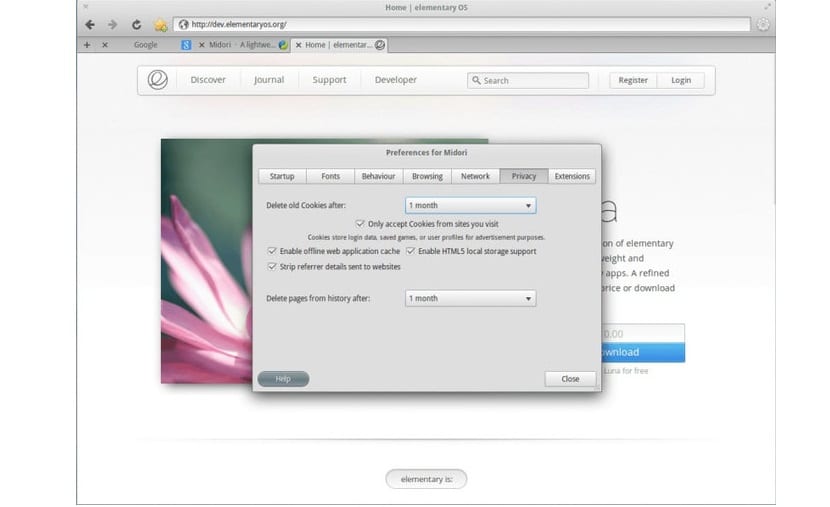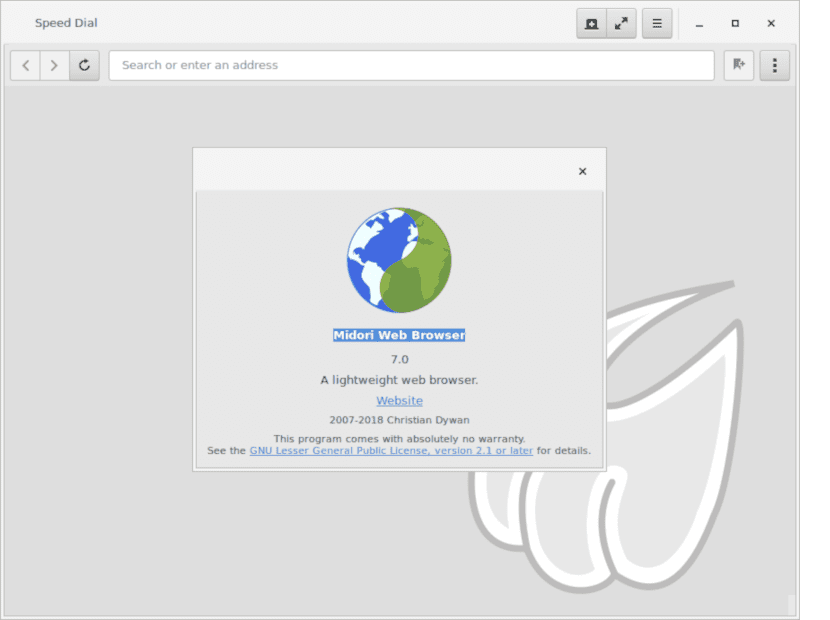
Midori is a lightweight but powerful web browser uses GTK as its graphical interface so it can be run without problems on desktops based on this such as Gnome, Xfce or LXDE, it has the possibility of using tabs or windows, session manager, favorites are saved in XBEL.
The search is based on OpenSearch, customizable menu actions its location (From version 0.4.0), styles and scripts support and expandable through scripts programmed in Lua (For which you must have Vala 0.1 installed at least).
About Midori browser
The program renders the pages quite well, although it fails with some javascripts like google maps.
It has an option that allows you to identify yourself as another browser, these being Firefox, Internet Explorer, Safari or the iPhone browser, this is useful since when browsing some sites do not identify it as a supported browser.
Midori currently part of the lightweight Xfce desktop environment, it is included in their Goodies component although some Linux distributions such as Arch Linux do not add it to the metapackage.
The LXDE project recommends this browser together with Chromium for use on the desktop.
Among its main characteristics we can highlight:
- Full integration with GTK + 2 and GTK + 3.
- Webkit rendering engine.
- Management of tabs, windows and sessions.
- Flexible and customizable web searches.
- Style script support.
- Simple management marker.
- Customizable and configurable user interface.
- Extensions written in C and Lua through Vala.
- Customizable context menu.
- Support for Oracle Java and Openjdk
- Adblock filter list support.
- Private browsing.
- Manage cookies and scripts.
One of the first things you'll notice about Midori is that she has a start time. The browser window loads almost instantly, with a page fully loaded a second later.
Once the window appears, they will see what the user interface is: there is only one row of buttons and the address bar, with a second hidden until you open more than one tab.
The buttons are quite small, so each row is relatively smaller compared to other web browsers.
How to install Midori browser on Ubuntu and derivatives?
For those who are interested in being able to install this web browser on their systems, they can do so by following the steps that we share with you below.
If they are Ubuntu 18.04 users, Ubuntu 18.10 must install this web browser through the Snap packages.
So all you have to do is open a terminal and install, since with these versions it is not necessary to add support to Snap.
The command they have to run in the terminal is:
sudo snap install midori
Users of previous versions if they want to install by this method, they must add Snap support to their systems.
Since there are application repositories for Ubuntu 14.04 LTS and Ubuntu 16.04 LTS, these are currently abandoned since the browser versions they have in them are already outdated.
Midori v7

The current stable version of the browser is v7 in which the core of the browser was completely rewritten in the Vala language, using specific features of GTK + 3.
The interface translates into the use of the Gtk.Application class, in addition to that in this version support for the global menu and the transfer menu was added in the window title.
A Gtk.Stack container was used to display the tabs and for the autotopology entry in the applied effluent classes of addresses in GLib.ListModel and Gtk.ListBox.
Besides, in this version of Midori it is possible to enable add-ons that are implemented with the Peas library and a new full-screen mode with automatic display of the toolbar is presented.
For devices with small screens, adaptive mode components were added from the toolbar.
In addition to the fact that the browser is capable of processing the content of individual tabs in different processes (multiprocessing mode).
That it has the Chromium engine is quite questionable